

Geofencing. Geolocation tracking. Geotagging. GPS tracking. Legal issues. Deanonymisation of geolocation data. What The Government Could Do With That Location Data. G log of geolocation. AVG to block phone location tracking. Geolocation and Middle East. Geolocation changing protests. Location location geolocation. Passing the buck on location tracking - Keith Perine. When it comes to police access to cellphone location data of suspects, Congress has left the courts holding the bag.
The high-stakes privacy debate over law enforcement tracking citizens using geolocational data is one Congress — despite a few bills and a hearing on the horizon — isn’t likely to resolve anytime soon. Lawmakers have left it to the courts, while the Supreme Court seemed to toss it back to the Hill recently. Continue Reading “It couldn’t be more up in the air than it is right now,” Susan Freiwald, a University of San Francisco law professor, said about the state of the law on smartphone tracking. “Practices just vary magistrate judge by magistrate judge and law enforcement agency by law enforcement agency.” These days, the same technology that ensures smartphone users can’t get lost on their way to a new restaurant allows the police to track their movements. If it sounds slightly Orwellian, that’s because it is.
Sen. But the justices split on the rationale for their ruling. California Requires App Makers to Post Privacy Policies. California wants privacy policies for mobile apps, declared California Attorney General Kamala D.
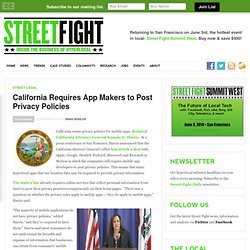
Harris. At a press conference in San Francisco, Harris announced that the California Attorney General’s office has struck a deal with Apple, Google, Hewlett-Packard, Microsoft and Research in Motion in which the companies will require mobile app developers to post privacy policies. We need to talk about sensors: How the internet of things could affect privacy. Here at Telefonica's Campus Party Europe tech festival in Berlin, this morning has seen some interesting sessions about privacy, with one in particular tackling the potential and risks of the internet of things.
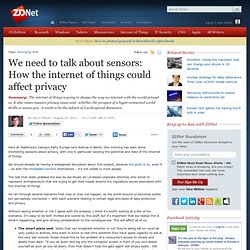
We should already be having a widespread discussion about this subject, because the push is on, even if – as with the embedded sensors themselves – it's not visible to most people. The talk that really grabbed me was by Joe Huser, an LA-based corporate attorney who tends to represent entrepreneurs that are trying to get their heads around the regulatory issues associated with the internet of things. He ran through several scenarios that may or may not happen, as the world around us becomes subtly but pervasively connected — with each scenario relating to certain legal principles of data protection and privacy.
Without saying whether or not I agree with his analysis, I think it's worth looking at a few of his scenarios. Some of these are pretty extreme or obscure cases, some not. Do Consumers Really Want to Passively Share Their Location? The new location-sharing app Glassmap wants to transform how we view and utilize location — in a way that will likely raise privacy questions among consumers.
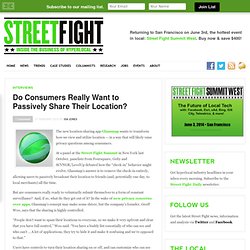
At a panel at the Street Fight Summit in New York last October, panelists from Foursquare, Goby and SCVNGR/LevelUp debated how the “check-in” behavior might evolve. Glassmap’s answer is to remove the check-in entirely, allowing users to passively broadcast their location to friends (and, potentially one day, to local merchants) all the time. But are consumers really ready to voluntarily submit themselves to a form of constant surveillance?
And, if so, what do they get out of it? In the wake of new privacy concerns over apps, Glassmap’s concept may make some shiver, but the company’s founder, Geoff Woo, says that the sharing is highly controlled.
Location-based social networking unveiled. Your cellphone sharing data. Others curations. German politician geolocation snoping. How to get the geolocation from browser. Foursquare geolocation. App genome project. US Schools grooming. Geolocation on pictures. Can You See Me Now?: Toward Reasonable Standards for Law Enforcement Access to Location Data that Congress Could Enact by Stephanie Pell, Christopher Soghoian.
Geo-Social Targeting for Privacy-Friendly Mobile Advertising. Live.com Exposes Location Data of Users. Location app+facial recognition at bars. Feds Patriot Ac location data. ACLU cellphone logs. Smartphone revealing every move.
Why Location Is About More than the Check-In. Geolocation trend 2010. Location based-presentation. Unnamed collection. Cross-platform location service. Scvngr gamers can check in by bumping phones together. Checking in can be pretty solitary.
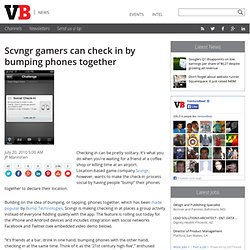
It’s what you do when you’re waiting for a friend at a coffee shop or killing time at an airport. Location-based game company Scvngr, however, wants to make the check-in process social by having people “bump” their phones together to declare their location. Building on the idea of bumping, or tapping, phones together, which has been made popular by Bump Technologies, Scvngr is making checking in at places a group activity instead of everyone fiddling quietly with the app.
The feature is rolling out today for the iPhone and Android devices and includes integration with social networks Facebook and Twitter (see embedded video demo below). Resources. New generation of location games catches on. Location-based social networks Foursquare and Gowalla, which launched the craze of “checking in” at locations such as restaurants or stores in exchange for points, are often described as games.

But they’re fairly simple examples as far as games go. Checking in at a bar with Gowalla (or Loopt, or Foursquare, or Brightkite) is done in a matter of seconds. But new location-based games are emerging that hope to command much more of a player’s attention. Booyah‘s MyTown, for example, has over 2 million active users, and the population grows by more than 100,000 players per week. Most users of the Monopoly-style game spend on average more than an hour on the app a day. Then there’s Parallel Kingdom (pictured) for the iPhone and Android platforms, designed by a company called PerBlue in Madison, Wisc.
Now Parallel Kingdom is more lenient in the way actual location is featured in the game. Orange Spain disclosing user phone number. I'm currently assessing how mobile operators modify and enrich HTTP headers.

I´ve already analyzed the main operators in France, Germany, Italy, Spain and UK with very interesting results I´ll publish soon. The focus of the study is double, first, check how users are identified when using mobile connections to browse the web and second, the modifications that the operators do to the HTTP headers like the User-Agent, Accept, Accept-Encoding... Regarding user identification mobile operators will normally have two methods depending on the site that the user is accessing.
For internal trusted sites they will add the user MSISDN (the phone number) in an HTTP header like x-up-calling-line-id, x-up-subno, x-nokia-msisdn or a proprietary one, while for the rest, and in order to protect user's identity, they will add a temporary ID instead. That will help the web site to track the user activity during a browsing session but will prevent the web site from fully identifying the user. Host: {REMOVED} Real Time Location Recruiting: Using Emerging Technology to Meet Prospects.
Dr John Sullivan and Master Burnett The smart phone and the applications associated with it are radically changing the game for advanced, technically savvy recruiters (others need not read on unless you like shaking your head in disbelief).
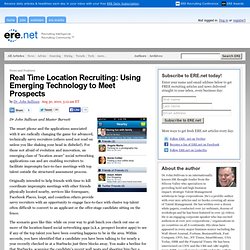
For those not afraid of evolution and innovation, an emerging class of “location aware” social networking applications can and are enabling recruiters to facilitate impromptu face-to-face meetings with top talent outside the structured assessment process. Originally intended to help friends with time to kill coordinate impromptu meetings with other friends physically located nearby, services like foursquare, Facebook Places, loopt, and countless others provide savvy recruiters with an opportunity to engage face-to-face with elusive top talent often difficult to convert to an applicant or the offer-stage candidate sitting on the fence.
Is this stalking? Yes! We’re not dismissing the idea of privacy. Location-based services find niche. Location Sites Experiment to Attract Mainstream Users. Still, wariness about broadcasting one’s location extends to city dwellers, too.
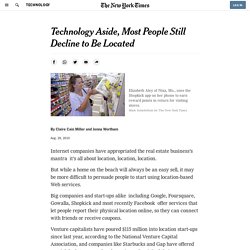
Marsha Collier lives in Los Angeles and writes “For Dummies” books on technology. She uses Whrrl and Foursquare as a way to share information about her life with her online fans and followers but instead of checking in when she arrives at a place, she checks in as she leaves, to avoid alerting people that she is away from home. “If I’m going to go work out at the gym, I’ll check in on my way out,” she said. “That way, you’re going to be home soon, so your house won’t be unattended for a long time.” Others let only a small circle of people see where they are.
Color photo sharing. I can stalk U. PostPref TrackMeNot. Géolocalisation et télécommunications (fr) Apple geolocation. Message Party chat. 4Chan's Sad War To Silence Gawker. @auburngal: Civility at Jezebel?
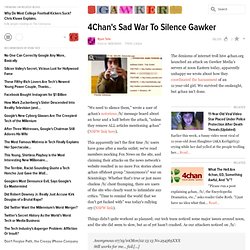
From dictionary.com: "2. a wicked, shameless woman. " From thesaurus.com: [I'm not even going there.] How 4chan Brought the Evil British Cat Bin Woman to Justice. Outriders: San Francisco set.